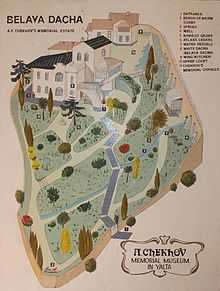White Dacha
| White Dacha | |
|---|---|
| Белая дача | |
 | |
| Established | 1898 |
| Location | 112 Kirova st., Yalta, Crimea, Russia/Ukraine[1] |
| Type | Memorial house |
| Collection size | Anton Chekhov's family objects, photographs, literary material |
| Website | A.P. Chekhov House-Museum in Yalta, official website |
The White Dacha, (Russian: белая дача; Ukrainian: біла дача) is the house that Anton Chekhov had built in Yalta and in which he wrote some of his greatest work. It is now a museum.[2][3]
Building
The White Dacha was built in 1898 following Chekhov's success with The Seagull. He took up residence there after his father's death and to aid him with coping with tuberculosis. Chekhov planted a variety of trees including mulberry, cherry, almond, peach, cypress, citrus, acacia and birch. He also kept dogs and tame cranes.[2][4]
The house was designed by L.N. Shapovalov. Aleksandr Kuprin described the house as follows: "It was, perhaps, the most original building in Yalta. It is all white, pure, easy, beautifully asymmetrical, ... with a tower, an unexpected ledges, with a glass veranda below and an open terrace above, with scattered broad and narrow windows... ". V.N. Ladygensky mentioned that "a dacha in Crimea, in Аutka, near Yalta, was validly constructed, excellent".[2][4]
From the study one can see the seafront that inspired "The Lady with the Dog", and out the back the scene that inspired the setting of The Cherry Orchard is visible. He also wrote the Three Sisters and The Bishop on the site.[2][5][4]
Museum

After Chekhov's death (1904) the house was looked after by Masha (his sister) until 1921 when it became a museum. During the Nazi occupation Maria Pavlovna had refused to leave and put up pictures of the Hauptmann (a German dramatist) on the wall and refused to let a German officer move into her brother's rooms. Nothing went missing but the house was damaged by one of the last air raids on the area by the Luftwaffe. [5]
Museum funding issues
The Soviet government, as with other such heritage sites, diligently looked after the house. But now following the breakup of the USSR who should pay for such duties is disputed. Crimea became an Autonomous Republic within Ukraine. The Museum now falls under the jurisdiction of the Ministry of Culture of the Crimean Autonomous Republic and their budget is extremely small. The Ukrainian state authorities' wish the Russian government to pay and vice versa. The house is now becoming dilapidated.[5] On May 11, 2010 Ukrainian President Viktor Yanukovych ordered the carrying out of repair and restoration works on the house.[6]
Noted visitors

Chekhov was a noted host and entertained Leo Tolstoy, Feodor Chaliapin, Sergei Rachmaninoff, and Maxim Gorky at the Dacha.[7][8] Leonid Kuchma and Vladimir Putin and their spouses visited the museum in 2003.[2][5]
See also
- Birthhouse of Anton Chekhov
References
- ↑ This place is located on the Crimean Peninsula, most of which is the subject of a territorial dispute between Russia and Ukraine. According to the political division of Russia, located on the peninsula are the federal subjects of the Russian Federation (the Republic of Crimea and the federal city of Sevastopol). According to the administrative-territorial division of Ukraine, located on the peninsula are the Ukrainian divisions (the Autonomous Republic of Crimea and the city with special status of Sevastopol).
- ↑ 2.0 2.1 2.2 2.3 2.4 "History of the House-Museum". Anton Chekhov Foundation/Yalta Chekhov Campaign. Retrieved 23 January 2010.
- ↑ "The House That Chekhov Built". BBC Radio 4. Retrieved 23 January 2010.
- ↑ 4.0 4.1 4.2 Chehov's House-museum Website
- ↑ 5.0 5.1 5.2 5.3 Pennington, Michael (2008-11-20). "Restoration drama: How Chekhov's home has fallen into disrepair". The Independent. Retrieved 23 January 2010.
- ↑ Yanukovych gives range of orders to Crimean government, Kyiv Post (May 11, 2009)
- ↑ Sarah Johnstone (2008). Lonely Planet Ukraine. p. 206.
- ↑ Benedetti, Jean, ed. (1998). Dear Writer, Dear Actress: The Love Letters of Olga Knipper and Anton Chekhov. Methuen Publishing Ltd. pp. 37, 270. ISBN 978-0-413-72390-1.
Further sources
- Bartlett, Rosamund (2004) Chekhov: Scenes from a Life (London: Free Press)
- Chute, Patricia (1998) Anton Chekhov: The House in Yalta and the Final Years, Harvard Review, No. 15 (Fall), pp. 119-123
External links
Coordinates: 44°29′28″N 34°08′30″E / 44.49111°N 34.14167°E